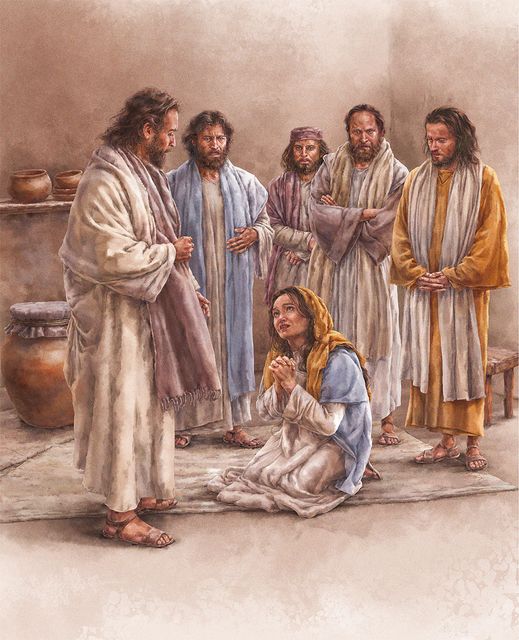
得主救恩
各位弟兄姐妹,
今天弥撒的三篇读经有一个共同的中心思想,就是天主的救恩不仅是给天主特选的民族——以色列人,也是给选民以外的外邦人,是给万世万代世上所有的民族的。但又如何能得到主的救恩呢?现在我就以“得主救恩”为道理题目,并根据今天弥撒的三篇读经,从以下三个方面:主的救恩给万民,主施救恩有先后,得主救恩靠信德,跟大家分享今天的弥撒读经。
一、主的救恩给万民
今天弥撒福音一开始就说:“耶稣离开那里,就退往提洛和漆冬一带去了。”“耶稣离开那里”,那里是哪里?根据上文,是指革乃撒勒地方(参玛14:34),是一个犹太人地区。由于耶稣在那里行了五饼二鱼以及驱魔治病等神迹,一些犹太人热烈拥戴耶稣,想立他为王,而另一些反对他的人变本加厉四处挑刺,在这反对与欢迎的双重压力下,主耶稣就退到外邦人地区提洛、漆冬境内。主耶稣退到外邦人地区去可能有2个重要目的:一是为了不让犹太人打扰他(参谷7:24);第二个更重要的目的是将福音传给外邦人,证明犹太人看不起的外邦人也是天主所爱的百姓,是主耶稣所要救赎的人,再一次证明主耶稣是全人类的救主。
就在主耶稣带着门徒们来到提洛和漆冬这一外邦人地区,有一个外邦人客纳罕妇女来到主耶稣面前,求耶稣治好她女儿的病,把附在她女儿身上的魔鬼驱逐掉。虽然耶稣没有马上答应她的要求,而是先用各种方式考验她的信德,但最后主耶稣还是因那位母亲伟大的信德,而治好了她女儿的病。耶稣借此告诉人救恩已临到外邦人,他不仅施恩给以色列人,也施恩给信靠他的外邦人,他是全人类的救主。
今天弥撒的读经一依撒意亚先知书的主题是:呼吁外邦人皈依上主、侍奉上主、爱慕上主的名,做祂的仆人,因为上主要领他们上祂的圣山,使他们在祂祈祷的殿里欢乐,祂的殿宇将称为万民的祈祷所。
在今天弥撒的读经二中,圣保禄宗徒向我们阐明的主题也是“耶稣是万民的救主”。圣保禄宗徒眼见天主的选民抗拒基督的福音,非常痛心,但他并不灰心;他一方面竭力设法让外邦人皈依耶稣,另一方面他暗中热切期望自己的同胞以色列人能回心转意,因重新接纳耶稣、信认耶稣而得救。
各位弟兄姐妹,我们因领受洗礼而成为新约的天主子民,但这并不保证我们因此就一定能得救,如果我们像旧约中的天主选民以色列人一样,背弃天主,不信认耶稣为救主,就有可能失去救恩。相反的,那些至今尚未领洗的教外人,如果他们能接纳耶稣、信认耶稣,将来也能得救恩。因此,今天的弥撒读经既是对我们这些天主子女的警告,也是给外教人的希望。
二、主施救恩有先后
当那位客纳罕妇女向耶稣求救时,耶稣最初并没有理她。门徒们因烦那妇女在他们“后面不停地喊叫”,就求耶稣满足她的要求,让那妇女赶紧走时,耶稣回答门徒们说:“我被派遣,只是为了以色列家失迷的羊。”(玛15:24)
初听耶稣这句话,我们会觉得耶稣似乎不愿意帮助那位外邦妇女。其实,主的回答不是拒绝。因为耶稣这句话中的“只是”二字是希伯来语风,意思是:祂被派遣的首要任务是为了拯救以色列人当中那些已远离天主的人,而不是说:祂对其他民族毫不关心。也正因如此,耶稣一开始没有答应那位外邦妇女的请求,后来因她再三的请求,耶稣看到她那么信靠他,就满足了她的请求,把她女儿的病给治好了。因此,耶稣的这句话是向我们表明:天主的救恩虽然是给万民的,但耶稣的拯救有着先后次序的不同。
也正因如此,救主耶稣选了犹太女子玛利亚作自己的亲生母亲,若瑟作自己的养父,而且诞生在犹太的白冷。耶稣诞生后,天主又首先派天使把救世主耶稣诞生的喜讯告诉给在犹大的牧羊人,之后藉异星引领三位贤士从东方前来犹大白冷朝拜救主耶稣。耶稣第一次派遣门徒们出外传教时,曾命令他们说:“外邦人的路,你们不要走,撒玛利亚人的城,你们也不要进;你们宁可往以色列家迷失了的羊那里去。”(玛10:5-6)可是耶稣在离世升天前,却对门徒们说:“你们往普天下去,向一切受造物宣传福音,信而受洗的必要得救;但不信的必被判罪。”(谷16:15-16)
圣保禄宗徒说:“我决不以福音为耻,因为福音正是天主的德能,为使一切有信仰的人获得救恩,先使犹太人,后使希腊人。”(罗1:16)
三、得主救恩靠信德
虽然天主赐予人救恩有先后之别,但人得天主救恩却只有靠信德。正如圣保禄宗徒说的“义人因信德而生活。”(罗1:17),也就是说,所有的人,无论是犹太人或外邦人,只有信仰基督的福音,才可得救。今天弥撒福音中的那位外邦人客纳罕妇女,她女儿的病之所以被主耶稣治愈,也是因为那妇女对主耶稣有一颗伟大的信德。主耶稣对那妇女说:“啊!妇人,你的信德真大,就如你所愿望的,给你成就吧!”从那时刻起,她的女儿就痊愈了。(玛15:28)
主耶稣说:“妇人,你的信德真大!”那客纳罕妇人的信德到底有多大呢?
在整个事件中,客纳罕妇人经历了一场信德的大考验。她三次向主耶稣祈求,一次比一次迫切,可经受的考验也是一次比一次重大。她首先向主耶稣喊说:“主,达味之子,可怜我吧!我的女儿被魔纠缠的好苦!”耶稣的反应是不理不睬。
接着门徒们为避免那妇人在他们后面不停地喊叫,想让她早点离开,就求耶稣答应她的要求,却遭到耶稣的拒绝,耶稣回答他们说:“我被派遣,只是为了以色列家迷失的羊。”可那妇人仍前来叩拜耶稣说:“主,援助我吧!”,仍不放弃。
第三次,主耶稣对那妇人说:“拿儿女的饼扔给小狗,是不对的。”主耶稣的这句话,我们可能会觉得不可思议,其实这是当时以色列人称呼外邦人的习惯性用语。以色列人认为他们是被天主拣选的子民,看外邦人都是狗,当然这其中是有一些贬低的意思。耶稣正是以当时的习惯性用语说了这句话,但他把那客纳罕妇人称作小狗。可那妇人并没有因为被耶稣比作小狗而生气,而且她还自认是只小狗,她回答耶稣说:“是啊!主,可是小狗也吃主人桌子上掉下来的碎屑。”客纳罕妇人清楚地知道:她作为一个外邦妇人,虽然不能像以色列人一样作为天主特别拣选的儿女,享受天主的怜悯和恩典,但只要主耶稣能给她一点点的眷顾和恩典,就心满意足感恩不尽了。客纳罕妇人这种恒久的、坚忍的、谦卑的信德,终于赢得了主耶稣的怜悯和垂顾。
反省:
各位弟兄姐妹,最后让我们反省以下三个问题:
1.今天弥撒三篇读经的共同主题是什么?
2.耶稣为什么称赞那位客纳罕妇人?
3.得主的救恩要靠什么?
愿我们能学像客纳罕妇人,满怀伟大信德,从而时时事事得主救援!阿们!

A house of prayer for all people
During today’s First Reading from the Book of Isaiah, [Is. 56:1, 6-7], we heard the Words of the Lord God, “My house shall be called a house of prayer for all peoples.” [Is. 56:7] In this prophetic exhortation and warning, the Lord promised to bring to His holy mountain all the foreigners, the Gentiles, who unite themselves to Him.
Today’s Reading from the Gospel of Matthew, [Mt. 15:21-28] the account of Jesus and the Canaanite woman, is one of the rare encounters of Jesus with Gentiles. As you all heard earlier, when Jesus went to the district of Tyre and Sidon, [Mt. 15:21] in Southern Phoenicia, He was approached by a woman who abounded in love for her daughter who was tormented by a demon. [Mt. 15:22] Most likely have heard of the great miracles that Jesus was performing towards the Jewish people, this Canaanite woman took it upon herself to personally locate Jesus and to beg His mercy on her.
What is unusual about this event is that the woman was a Canaanite. In Deuteronomic literature, the Canaanites was viewed as a very sinful race that embodied every possible evil and godlessness. The Canaanites were viewed as a nation that was to be exterminated. It was not the general practice for the Jewish people to mix with the Samaritans, also, it was not the general practice for them to mix with the Canaanites. So what was Jesus to do when He was approached by a race that was avoided by the Jewish people?
At first, he ignored her. He did not answer her at all. [Mt. 15:23] The more Jesus ignored her, the more the woman shouted, “Lord, Son of David, have mercy on me!” The more the woman shouted, the more the disciples of Jesus were getting annoyed and urged Jesus to send her away so she will stop shouting. In this particular case, when the disciples were urging Jesus to dismiss the woman, this was not a request to just get rid of her. Based on the exact meaning of the original writing of this passage of the Holy Scripture, their request was for Jesus to dismiss the woman by granting her petition.
To this, Jesus answered, “I was sent only to the lost sheep of the house of Israel.” [Mt. 15:24] How harsh these words must have sounded to the woman. It was like saying to her, “God’s mercy is only for my people, the Palestinians. You are a Canaanite; go away!” This incident would be similar to someone going to a priest to confess his sins and the priest tells him to go away because he only hears the confessions of those of a certain nationality. Talk about discrimination! Was Jesus going to discriminate?
Anyway, the determined lady knew a good thing when she saw it and she was not about to give up on Jesus. She threw herself at His feet and repeated herself, “Lord, help me.” [Mt. 15:25] Jesus responded, “It is not fair to take the children’s food and throw it to the dogs.” [Mt. 15:26] To this, she answered, “Yes, Lord, yet even the dogs eat the crumbs that fall from their master’s table.” [Mt. 15:27] Seeing how great her faith was, she having remarkably persisted, Jesus told her, “Woman, great is your faith! Let it be done for you as you wish. And her daughter was healed instantly.” [Mt. 15:28]
The conversation that took place between Jesus and the Canaanite woman is an example of dialogues that are admired in the Near East. Many refer to this type of dialogue as wisdom. Why wisdom? Because it requires a certain ability to match a riddle with a riddle, a wise saying with another wise saying, an insult with another insult, or as in the case of today’s Reading, to turn an insult into a commitment. In affirming His having been sent to minister to the Jewish nation, Jesus appeared to be very harsh towards the Canaanite woman. That is because He acted like a real Palestinian of those days.
By granting favour to the persistent woman, Jesus affirmed that He had been sent to institute “a house of prayer for all people.” His Kingdom that is on earth now and that is to come was not meant for only one people; it was meant for all the nations.
